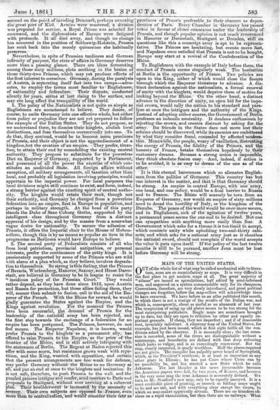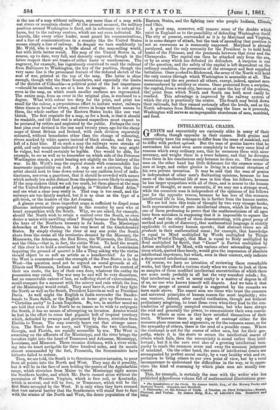MAPS OF THE UNITED STATES. O UT ,Of the Whole list
of whatmay he called mechanical aids to litera- ture, none are so unsatisfactory as maps. It is very difficult in the first place to get modem maps at all. The great majority of "atlases' are issued as speculations; half edited by semi-informed men, and engraved on a system 'commendable only for its cheapness. Corrections; therefore, are Very slowly introduced, and great political changes are forgotten before the map-sellers will acknowledge them to have occurred.. We have before us an atlas published this month, in which there is not a vestige 'of the results of the Italian war, and which is, consequently, about as useful as an almanaek of last year. The temptation of using up old plates seems to be too strong for the most enterprising publishers. Single maps are sometimes brought Up to date, but they are open to 'criticism on 'other and equally im- portant grounds. cheap; they are imperfect ; and if of reasonable cost, invariably indistinct. A sixpenny'map of the United States, for example, has just beenissued,'whichat first sight fulfils all the con- ditions, asked by. the observer. It is unusually clear ; the' last seces- sion. is recorded,, some of the rivers are distinguishable without a microscope, and boundaries are defined with that deep colouring which looks so vulgar, and -is so exceedingly convenient. But the map, closely inspected, is nearly worthless. Half the places required arc not given. The compiler has palpably never heard of Springfield, which, as the President' 'residence,' is at least as important as any other..placc in Illinois ; he has put Cairo where Cairo can by no.' possibility be, and has (treated a new State which he calls Arkansas.:. The last blunder is the more inexcusable because the American papers were full, for. two years, of KansaS, anaecausc in the very same. amp the true Arkansas is accurately defined. We turn to Mr. Stanford's new map, only to be equally annoyed. It is a most creditable piece of printing, as smooch as folding maps ought to be and are lot, and with everything clear except the rivers, to which no map-maker'apparently attends. There are no blunders ob- vions'on a rapid examination, butthen theta are no' railways. What is the use of a map without railways, any more than of a map with- out rivers or mountain chains? At the present moment, the military
position around Washington is fixed, not in reference to natural fea- tures, but to the railway centres, which are not even indicated. Mr. Lincoln, like every other leader, must guard his communications,
and a line of communications in a country like the United States means simply a line of railway. In despair we turn confidently to Mr. Wyld, who is usually a trifle ahead of the map-selling world, but with little better result. His map of the United States is, of course, up to date, very full, and decently engraved, though in the latter respect there are traees of either haste or carelessness. The engraver, for example, has ingeniously contrived to omit the railroad from Baltimore to Washington, the key of the position, though the very same line is the prominent feature of the reduced sketch of the seat of war, printed at the top of the map. The latter is clear enough, though why the State boundaries, and especially the limits of the district of Columbia—a political point of the last importance —should be omitted, we are at a loss to imagine. It is not given even in the map, on which much smaller surfaces are represented. The entire map, from an error in the original plan, is confused to a
degree. What with colour too deep for the print, and print too small for the colour, a preposterous effort to imitate water, railways three times as broad as rivers, and rivers in heaps without names to them, the whole surface of the Eastern States looks like one vast blotch. The first requisite for a map, as for a book, is that it should be readable, and till that end is attained mapsellers must expect to be pestered by critics and neglected by the public. Perhaps the very best plan ever devised is the one used twenty years ago for the cheap maps of Great Britain and Ireland, with each division separately coloured, without boundaries other than the change of colouring, rivers marked by white spaces instead of black streaks, and the sea left of a faint blue. If on such a map the railways were streaks of
gold, and only mountains indicated by dark shades, the map might vulgar, but would certainly be legible. One would be able, for example, to see as well as to remember on which side of the Potomac Washington stands, a point bearing not slightly on the history of the war. In Mr. Wyld's map the capital stands with commendable but inaccurate impartiality on both. A map is not a picture, that the artist should seek to tone down colour to one uniform level of indis- tinctness, nor even a gazetteer, that it should be crowded with names which nobody ten miles distant from the places is ever likely to require. If the map-makers think we ask too much, let them glance at the map of the United States printed at Leipzig, in " Stieler's Hand Atlas,' and see what a clear map really is. That map is too small, and the railways are too faintly marked, but it is as clear as the type of a gift-book, or the leaders of the Art Journal. A glance even at these imperfect maps is sufficient to dispel some illusions industriously propagated in this country by men who at heart sympathize with the South. Why, we are asked, for example, should the North wish to retain a control over the South, or even desire a union with unwilling allies ? Simply because the South holds the keys of the Northern treasury in its hands. The Mississippi debouches at New Orleans, in the very heart of the •Confederated States. By simply closing the river at any one point the South shuts from the ocean all the territories drained by the Missouri, the Minnesota, the Arkansas, the Red River, the Wisconsin. the Illinois, and the Ohio,—that is, in fact, the entire West. To hold the mouth of this river is to hold a continent by the throat, and a Louisianian inquiring the ground of quarrel is like a Thug asking why the victim should object to so soft an article as a handkerchief. As far as the West is concerned—and the strength of the Free States is in the West—the question need not be argued on moral grounds at all. Illinois and Wisconsin, Indiana and Ohio, must have the control of their sea route, the key of their own door, whatever the outlay its possession may entail. The war may be and will be very disastrous, but no conceivable extent of loss, no suffering short of extermination, could compare for a moment with the misery and rain which the loss of the Mississippi would entail. They must have it, even if they fight the North as well as the South, President Lincoln as well as President Davis. As well might the English in India surrender the Sunder- bands to Nana Sahib, or the English at home give up Sheerness in " Christian amity" to Louis Napoleon. So, too, in another mood we are told that even if the North be so insane as to wish to subjugate the South, it has no means of attempting an invasion. Armies would be lost in the effort to cross that gigantic belt of tropical territory which, defended by swamps and garrisoned by fevers, stretches from Florida to Texas. The map scarcely bears out that strange asser-. tion. The South has no navy, and Virginia, the two Carolinas, Georgia, and Florida, are equally accessible by sea. The West is swarming on the affluents of the Mississippi, and the river brings the invaders right into the heart of Tennessee and Arkansas, Mississippi, Louisiana, and Missouri. There remains Alabama, with a river strik- ing into its heart navigable for three hundred miles, and its mouth almost commanded by the fort, Pensacola, the Secessionists have hitherto failed to reduce.
Then, we are told, the South is to threaten counter-invasion, to pour from all points into the North and West. They may do it possibly, but it will be in the face of men holding the passes of the Appalachian range, which stretches from Maine to the Mississippi right across the Southern border, and which Mr. Davis cannot cross without the permission of Western Virginia, which is free soil, or Kentucky, which is neutral, and will be free, or Tennessee, which will be the first State occupied by the West. It is only when they have crossed that vast natural barrier that the Southerners will stand face to face with the armies of the North and West, the dense population of the
Eastern States, and the fighting race who people Indiana, Illinois; and Ohio.
A good map, moreover, will remove some of the doubts which exist in England as to the possibility of defending Washington itself. The city at present, surrounded as it is by Maryland and Virginia, is in some danger of attack, but the task of amending that position is not so enormous as is commonly supposed. Maryland is already paralyzed, and the only necessity for the President is to hold both banks of the Potomac, and the peninsula between that river and the Chesapeake. The capital can then be attacked only from the sea, or by an army which has defeated its defenders. A surprise is out of the question, and the safety of the capital is left dependent on the ordinary condition, the possession of the strongest and best supplied battalions. Once pushed to Richmond, the army of the North will hold the only routes through which Washington is accessible at all. The mountains and the sea protect all others, except, indeed, against men unencumbered by artillery or stores. Once protected from a surprise, the capital, from a weak city, becomes at once the key of the position, the: point from which North and South can both most easily be reached. This advantage is improved by the railway system of which the city is practically the centre. The South may break down their railroads, but they cannot seriously affect the levels, and as the North advances from Richmond, repairing the lines as it proceeds, Washi ,,ton will serve as an impregnable storehouse of men, materiel, and food.































 Previous page
Previous page